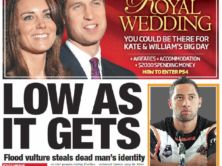
(Credit: Public Domain Image)
When the UK Sun went undercover last fall to report on a “cash-for-access” political scandal, a Member of Parliament cried foul.
However, UK press regulator the Independent Press Standards Organisation resoundingly rejected the complaints of Andy Burnham that the three stories in question were “fishing expeditions,” misleading and not in the public interest. Burnham also took umbrage with comments the Sun reported that he’d made about Labour Party leader Jeremy Corbyn, though IPSO found no problem in that regard either.
Posing as a “wealthy businessman from Dubai,” the undercover Sun reporter met with Muslim Friends of Labour chairman Faiz Ul Rasool, who previously donated several thousand pounds to Burnham’s political campaign. Rasool told the undercover reporter that he could set up a meeting with Burnham if he received a £5000 donation. Two days after receiving the check, Rasool arranged for the undercover reporter to go to a Burnham campaign event and meet the politician. The stories that resulted from this effort were published on Sept. 11 and Oct. 2 in the Sun.
Burnham complained to IPSO because he thought the articles “gave the misleading impression that he had acted illegally or improperly and inaccurately stated that he had been caught up in a ‘cash for access’ scandal,” according to IPSO.
But IPSO agreed with the Sun‘s decision to use undercover reporting as it was in the public interest, “reasonable” and “justified.”
“The newspaper was able to demonstrate that it carried out a structured investigation, assessing at each stage whether the information it had obtained justified the further use of subterfuge,” IPSO ruled.
The Sun declined to comment to iMediaEthics about the ruling, pointing to its comments in the IPSO ruling. iMediaEthics has written to Burnham’s office and tweeted Rasool to ask for comment on the ruling.
The Sun explained it decided to use undercover reporting because Rasool probably wouldn’t have given the information to a journalist and it was in the public interest to learn if a middleman was able to set up meetings with the politician for donations. The Sun‘s managing editor, senior editorial staff and a lawyer discussed and OKed the undercover reporter going to the campaign event and taping it as evidence, IPSO said.
As to how IPSO handled the investigation, the press regulator stated: “The newspaper provided IPSO with a detailed timeline of the investigation, including an account of meetings between senior editorial figures and the newspaper’s legal department, at various stages, to assess whether the use of subterfuge was justified and whether the subsequent publication of the material was warranted.”
In addition to complaining about the undercover reporting, Burnham complained about accuracy, right of reply and invasion of privacy, but those complaints were rejected as well. IPSO found that the Sun accurately reported the interactions with both Burnham and Rasool, while noting that Rasool didn’t complain about the coverage. “While the Committee sympathised with the complainant’s position that he had been innocently drawn into the scandal, this was accurate: Mr Rasool had accepted £5000 from an individual, purportedly a non-UK national, in exchange for organising a meeting with the complainant,” IPSO explained.
Burnham’s complaint over right of reply was that the Sun didn’t include all of his spokesperson’s comments in an earlier version of its reporting. IPSO rejected that complaint, as well.
Concerning privacy, it wasn’t invasive for the Sun to report Burnham’s comments at the campaign event because it was just that – a campaign event, IPSO said. “Given the nature of the event, any reasonable expectation of privacy which the complainant had, in the circumstances, was limited,” IPSO said. The information the Sun reported wasn’t personal, but in the public interest.
Burnham’s reported comments about his party’s leader Corbyn “would not – in itself – have justified an investigation using subterfuge; however, given that the newspaper had separately justified the use of subterfuge to attend and record the meeting, this was sufficient to justify publication of the comments as a matter of public interest.”
The three articles Burnham complained about were:
- “Bung me £5k to meet Burnham”
- “Publicly: ‘Corbyn’s a nice man’ privately: ‘he will be a disaster’”
- Exposed Burnham fixer dismissed as ‘fantasist’ cheers on Jeremy Corbyn at conference”







Comments Terms and Conditions